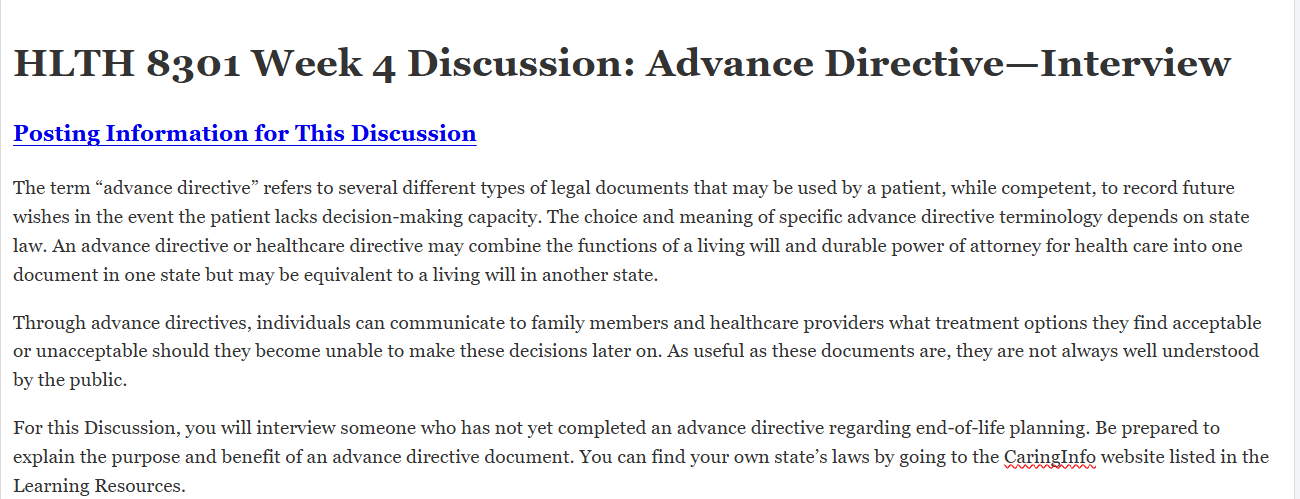HLTH 8301 Week 4 Discussion: Advance Directive—Interview
The term “advance directive” refers to several different types of legal documents that may be used by a patient, while competent, to record future wishes in the event the patient lacks decision-making capacity. The choice and meaning of specific advance directive terminology depends on state law. An advance directive or healthcare directive may combine the functions of a living will and durable power of attorney for health care into one document in one state but may be equivalent to a living will in another state.
Through advance directives, individuals can communicate to family members and healthcare providers what treatment options they find acceptable or unacceptable should they become unable to make these decisions later on. As useful as these documents are, they are not always well understood by the public.
For this Discussion, you will interview someone who has not yet completed an advance directive regarding end-of-life planning. Be prepared to explain the purpose and benefit of an advance directive document. You can find your own state’s laws by going to the CaringInfo website listed in the Learning Resources.
Resources
Be sure to review the Learning Resources before completing this activity.
To prepare for this Discussion:
- Review the description of advance directives in the Learning Resources.
- Download and print an advance directive form that is valid in your state. A link to these forms is available at the following webpage:
- CaringInfo. (n.d.). Download and complete your state or territories’ advance directive formLinks to an external site.. http://www.caringinfo.org/i4a/pages/index.cfm?pageid=3289
- Identify an individual you can interview in person about advance directives. This may be a friend, family member, or other acquaintance that has not yet completed an advance directive form.
- Sit down with this person and invite them to read the form and consider completing it. It does not matter whether the person actually does so or not. Take notes on any questions the person asks, whether they understand the purpose of the form, whether they think the form is a useful way of dealing with future health care issues, and other key points and concerns expressed during the interview.
By Wednesday
Post your Discussion, to include the following:
- Analyze the ways in which an advance directive might support a patient’s legal and ethical rights and the impact an advance directive might have on end-of-life care from the perspective of healthcare providers and organizations.
- Considering the interview you conducted, describe any questions, comments, or concerns your interviewee expressed regarding how an advance directive supports their legal and ethical rights.
- Apply the ACHE policy for end-of-life planning for patients. Also include a description of the legal standards and basic ethical principles that may apply.
- Based on the interview you conducted, evaluate how healthcare providers can be more effective in their communication with patients on preparing an advance directive.
Support your response by identifying and explaining key points and/or examples presented in the Learning Resources.
Read a selection of your colleagues’ postings. Consider how your colleagues’ postings relate to the information presented in the Learning Resources and to your own posting.
Refer to the Week 4 Discussion Rubric for specific grading elements and criteria. Your Instructor will use this grading rubric to assess your work.
By Friday
Respond to at least two of your colleagues’ postings in one or more of the following ways:
- Share an insight that you gained from having read your colleague’s initial post.
- Offer an additional perspective on how healthcare providers can be more effective in their communication with patients who are preparing advance directives.
Continue engaging in the Discussion through Sunday.
SOLUTION HLTH 8301 Week 4 Discussion: Advance Directive—Interview
Hello Class,
#Main Post
How Advance Directives Protect Legal and Ethical Rights
Advance directives are critical in upholding a patient’s autonomy by documenting their healthcare preferences in advance. Legally, these directives, such as the durable power of attorney for healthcare and living wills, provide a framework to respect a patient’s right to self-determination (NHPCO, 2023). These documents ensure that patients’ choices about life-sustaining treatments, organ donation, and other critical decisions are honored, even if they cannot communicate their wishes…
Kindly click the purchase icon below to buy the full solution at $5
(FINAL ANSWER) HLTH 8301 Week 4 Assignment: Legal Case Review

